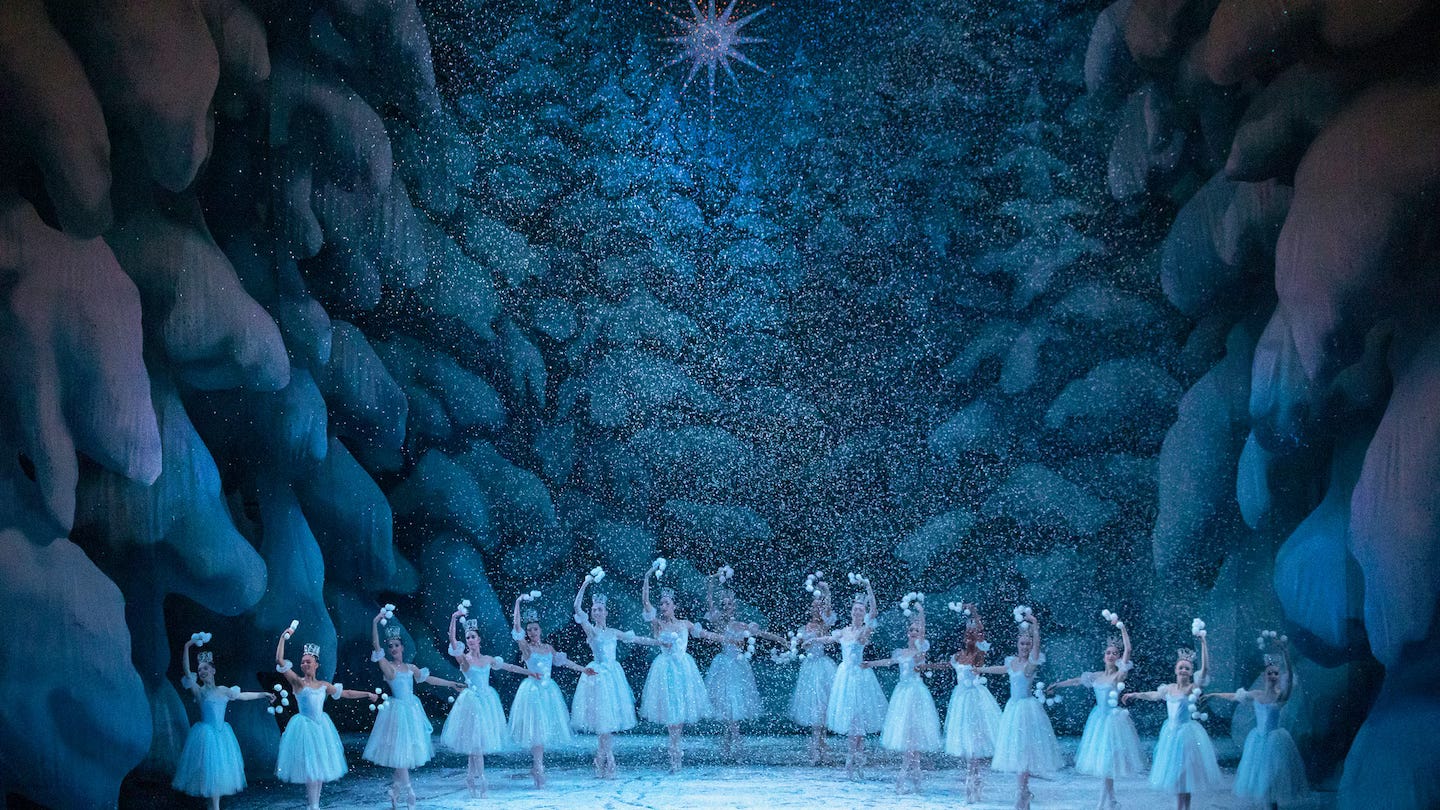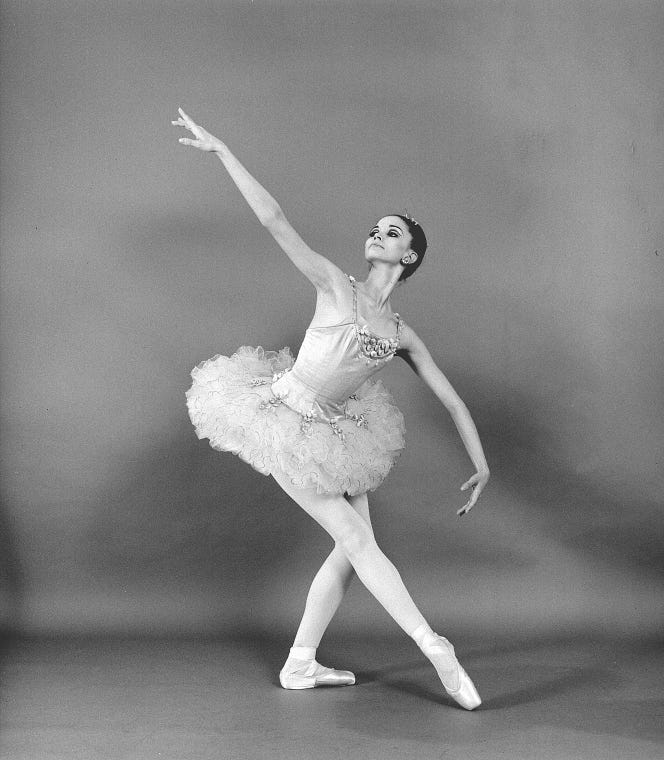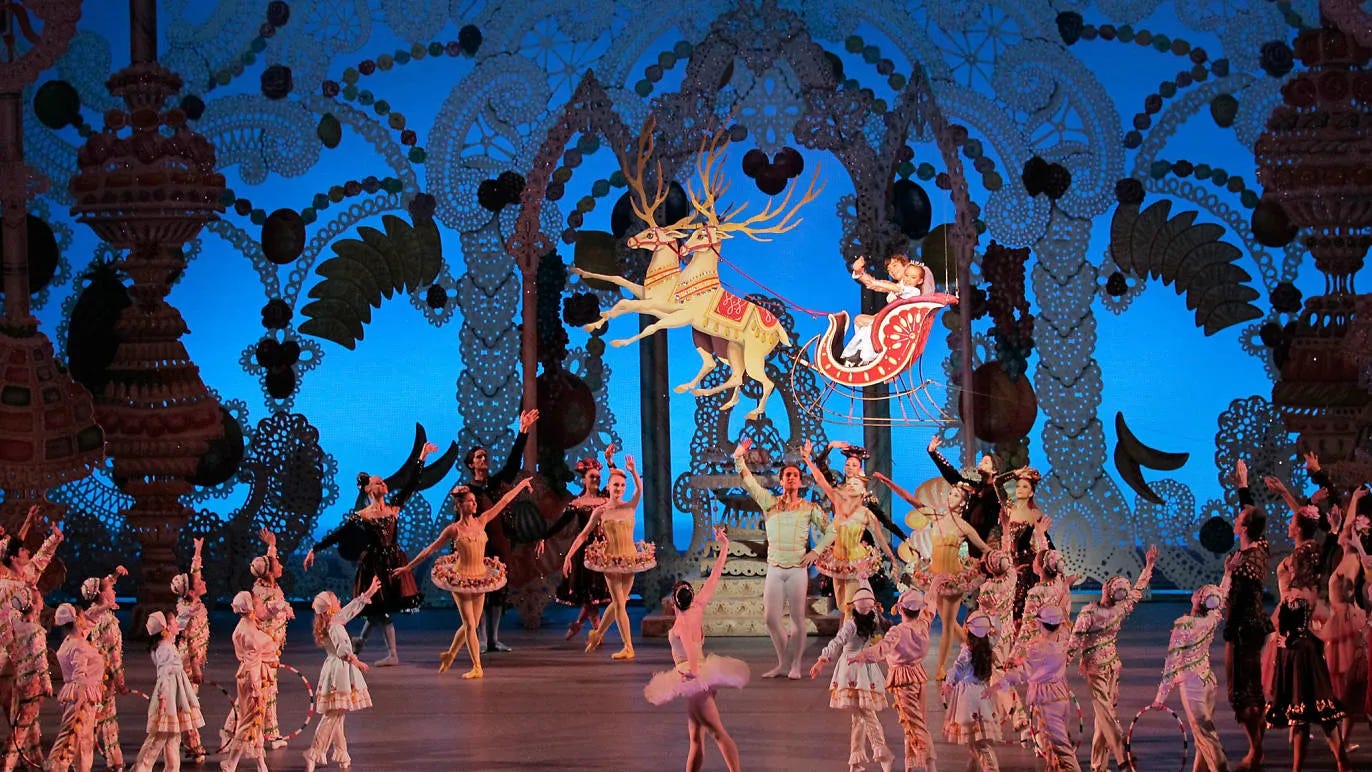On The Nutcracker, and Glimpses of the Infinite
In which I go to the ballet and consider what it means to grow up. And other fun things like that!
Over the weekend my sister and I attended a matinee of The Nutcracker at Lincoln Center. As we made our way with the rest of the crowd to the entrance, we tried to remember the last time we’d seen it. Back when we were kids in Vancouver? Maybe when the Royal Winnipeg Ballet was in town? In any case, I was excited. I’d bought these tickets when they first went on sale, back in July, which is a little insane, because who can think about Christmas when it’s ninety degrees outside? (And I say this as a person who loves Christmas.)
But there’s a reason New York City Ballet warns you to buy your tickets well in advance. People go crazy for The Nutcracker! Myself included. It’s a pure distillation of the childhood experience of Christmas, the images in the story plucking a deep chord of familiarity: the children peeking through the keyhole at the tree, jumping up and down at the prospect of presents. The ballet captures the aching intensity and feverish joy of childhood—those heightened moments when the whole world lights up with possibility—more than almost anything I’ve ever seen.
When the curtain came up and the overture began to play, I had a Pavlovian response (or maybe a Proustian response is more apt), a ripple of pleasure that was equal parts anticipation and mystery. Like a kid on Christmas Eve, I knew what was going to happen next, but I also sort of didn’t. One thing I’d forgotten was how much narrative and pantomime there is in the first act, and relatively little in the way of dancing. Even with those magical moments (the toys coming to life, the Christmas tree rising from the stage), the first act is primarily concerned with storytelling, and reality. It’s not until that very last scene of the first act, after the rest of the house has fallen asleep on Christmas Eve, when the snowflakes begin to dance for Marie and the Prince, that the ballet leaves behind narrative and enter a more purely experiential realm of dance.
In the second act, the story pretty much consists of Marie and the Prince sitting on their throne and watching various characters dance: the chocolate, the coffee, the tea, the candy canes and the flowers. It’s a happy tableau. There are no bad guys, no looming specter of anything bad. At one point I jokingly whispered to my sister, Not a lot of conflict in this thing, huh? “Everyone is delighted that the Prince and Marie are safe,” the program description says, “and the Sugarplum Fairy leads them to a glittering throne, where they can enjoy cakes and candies.” The performances are stunning (the sensual coffee performance was particularly incredible), and they don’t need to tell a story in order to impress the children, or the audience for that matter.
But at the very end of the ballet, the Sugar Plum Fairy and her cavalier enter the stage, and they dance their pas de deux. This was where, for my money, the ballet went from beautiful to transcendent. This was where my feeling of enjoyment turned into something more tender, more aching. I found myself wondering if there was a story, after all—if it was just subtler than I realized.
Sometimes, when I remember how insanely excited I would get as a kid at Christmas, how it would be impossible to sleep the night before, how I would start asking my parents if I could open presents at 5 a.m., I think: Wow, I’m never going to be that excited about anything ever again. My ceiling for the experience of happiness was a lot higher as a child, and not just at Christmas: it was also there in the pleasure I took in being allowed to buy a candy bar on Fridays, or in getting my hands on the new installment of Harry Potter. As a little kid I worried about friends and school, about being called a nerd or a loser, about getting punished for misbehaving, that kind of thing, but those worries were extremely minor in the scheme of things. I didn’t yet have an internal voice of worry or criticism. So when something especially good was happening, something like unwrapping a Mars Bar or opening The Prisoner of Azkaban, I gave myself over entirely to that experience. There was no inner voice saying, Do you really need to eat that chocolate? or, Shouldn’t you be working instead of reading right now? To be honest, there probably wasn’t any inner voice at all. If there was, it would have just been saying something like CHOCOLATE!!!!! or WIZARDS!!!!
I think that’s one reason for the intensity of pleasure I took in these things. The other reason is probably because I didn’t, as a child, actually possess any real autonomy. I wasn’t allowed to eat candy on days besides Friday. I had to ask my parents whether they would buy the new Harry Potter for me. Pleasure was gained by appealing to the deities, the beings who actually possessed power. When you’re a child, that’s what gives the parental gods on Mount Olympus so much power: their ability to decide. They can decide to let you eat something, or not. They can buy you that thing, or not. It’s the possibility of the “or not” that haunts the experience of possession, and which gives you, the child, that especially intense sensation of having gotten away with something, of having stolen this pleasure from the gods.
And then you grow up, and you get a job, and you gain responsibility, and now that you can buy yourself candy and stay up past your bedtime, and it turns out the gods are no longer involved in these decisions, they lose some of their allure. Also, you start to hear about how sugar is bad for you, and how the most successful people are the ones who wake up at dawn, so probably you should start eating healthier and going to bed earlier. Also, there are all these other things you have to worry about. Your career, earning money, paying your rent, filing your taxes, getting your teeth cleaned every six months, exercising, grocery shopping, finding a partner, making decisions like Where should I live? and How should I vote? and Should I have a child? and Should I stop eating meat? and Do I really want to watch Breaking Bad like everyone tells me to, or nah? It’s hard to entirely devote your attention to something when there are all these other nagging, persistent, grown-up questions and reminders in the back of your mind.
This is part of why I get so much writing done on airplanes and trains. It’s part of why it’s so nice being on vacation. It’s part of why I treasure going to church every Sunday. It’s part of why I love the darkness of a movie theater—and the ballet, for that matter. It’s the narrowing of possibility, the elimination of distraction; the way the rest of the world dissolves, and your ordinary surroundings cease to be visible. And when you’re really lucky—when you’re having a good writing day and you lose yourself in that sense of flow—when the sunset is so beautiful that it stops you in your tracks—when you engage in the same rite that someone engaged in two thousand years earlier—then perhaps your ordinary sense of time dissolves, too.
I’ve always loved this passage from Speak, Memory. Nabokov captures it better than I ever could:
I confess I do not believe in time. I like to fold my magic carpet, after use, in such a way as to superimpose one part of the pattern upon another. Let visitors trip. And the highest enjoyment of timelessness―in a landscape selected at random―is when I stand among rare butterflies and their food plants. This is ecstasy, and behind the ecstasy is something else, which is hard to explain. It is like a momentary vacuum into which rushes all that I love. A sense of oneness with sun and stone. A thrill of gratitude to whom it may concern―to the contrapuntal genius of human fate or to tender ghosts humoring a lucky mortal.
The Sugar Plum Fairy’s pas de deux is the final dance in the ballet. After that, Marie and the Prince board the flying sleigh and return to the real world, where presumably by now it’s Christmas morning. The music of the pas de deux is astonishingly beautiful. So is Balanchine’s choreography (you can watch it on Youtube here). That was enough to move me, but what planted the ache in my heart, what caused me to cry quiet tears in the darkness of the David H. Koch Theater, was the sense that the pas de deux is almost like a valediction: a last expression of magic before the spell is broken. This moment, right here, this final sequence of sublime physical and musical artistry, is what gives meaning to everything that came before. It’s a culmination, and also a farewell, because after this dance ends—and it’s so beautiful that you don’t really want it to end!—the children will return to reality, to that world where time passes and people grow older, where life isn’t just sitting on a throne eating candies, where conflict and loss are bound to happen.
But The Nutcracker needs to end in this way, with the children returning home, with the children growing up. Life is only meaningful because it is finite. A story is only a story because it ends. This return, this closing of the circle (a kind of version of the hero’s journey), is what gives the ballet a sense of completion. It’s also, of course, more than a little sad: especially for the adults in the audience, because they are the ones who know that losses and heartbreaks are the inevitable cost of growing up.
But if finitude is what creates meaning, then we reach for the infinite in order to bear it. We reach for the moments of transcendence and timelessness, whether it’s Nabokov and his butterflies, or the Sugar Plum Fairy’s dance: starry holes punched through the night sky, sparkling and fleeting consolations whose dazzle is only visible because they are set against the darkness. As a little kid, it was the toys and the tree and the playfulness of the ballet that I loved. As a grown-up, I find myself loving something very different about it.
Before I say goodbye, a letter of recommendation. It’s December, which means it’s the sprint to the end of the year, although to be honest, lately I’ve been letting myself take an easier approach to things. My book tour for The Helsinki Affair has pretty much wrapped up, and it was so much FUN but I also need a NAP! So I’ve been catching up on things like sleeping and walking and reading, and also baking. It’s too dark, it’s too cold, but you know what helps with that? Sugar! The other day I made Joy the Baker’s cranberry orange loaf and it was fantastic. I cut the loaf in half to bring one half to my sister and the other half to the friends who were hosting us for the dinner that night, although I did sneak a little slice out of the middle, because I had to try it to make sure it came out okay. Science, you know. And then the friends who were hosting us that night made Smitten Kitchen’s olive oil brownies for dessert, and damn, these were even more fantastic. Intense and rich in the best way possible.





